
Photog's log:
10 a.m. on a Sunday
It's a green gem in the middle of one of the world's most
densely populated places and obviously well loved. I look around at
the people walking in with me: Everyone is smiling even before they
step through the gates.

Above: All right! No lawn around trees' trunks. The trees
don't have to fight with that top-dog plant -- bluegrass -- for
water that falls there.
Below: In the herb garden the smells make me hungry. (Hmmm.
Did I eat breakfast? Does you forget things like that, too, when
you're focused on getting out into or out to a garden?) Nothing
like a hot dry summer to bring out the best in Mediterranean plants
like bay, rosemary and lavender.



Details, such a glory of them! The rounded form
of the pot with the round clumps of hosta and hydrangea... and the
connection between pot color and the markings on the
alstroemeria!
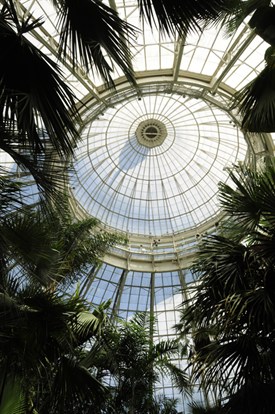
It's got to be expensive to maintain a structure like the
Victorian-style Haupt Conservatory. Thank goodness for public
gardens where users essentially chip in to keep up what none of us
could on our own.

We've been pooh-poohed for growing plume poppy
(Macleaya cordata), with comments such as, "Why do you
grow such an invasive thing?!" It's great to see it here
and know we're in good company as we find uses for it that
compensate us for the effort of containing it. We like its stature
(6', sometimes more) and dramatic foliage (big and gray green with
a near-white underside that shows itself in any breeze). The large
off-white plumes and salmon-cream seed pods that follow are a
bonus.
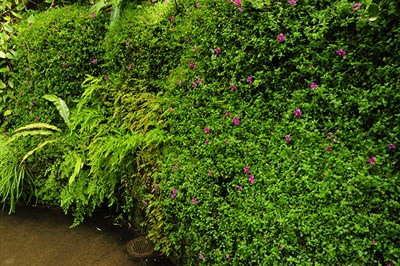
Green walls or "vertical gardens" have recently become a
feature in architecture and interior design. (There are many
"systems" for sale now, but we think people should look first at
how it's done at NYBG and other public gardens, or get information
from those who are not out to sell us something, such as Phil and Vicki Yates...) Hah, as if
conservatories haven't been doing them for centuries -- vertical
surfaces covered with epiphytes
such as Platycerium ferns (a group that includes the
antler-like staghorn- and elkhorn ferns; below). I feel and breathe
in the cool, moist air as I pass them.


 The Home Gardening Center models
super-productive beds and techniques for gardeners with very little
room.
The Home Gardening Center models
super-productive beds and techniques for gardeners with very little
room.
I overhear someone saying "There's a new idea, an apple tree
on a wall!" But it's not new. City gardeners have been growing
fruit via espalier
for thousands of years. It's a technique as old as the need to
bring essential food production into the safety of a fort or walled
compound.
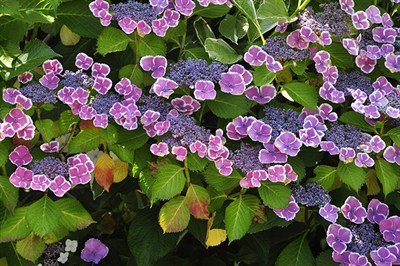
Above: Argh! It is so hard to be a hydrangea-challenged
Midwesterner on tour during the blooming season of the
lacecap- and mophead. (Hydrangea serrata, H. macrophylla
and their hybrids)
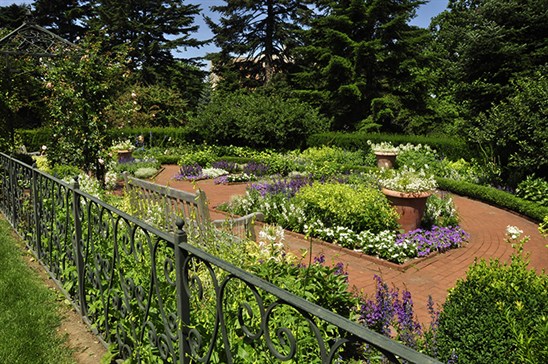 Right: It really is true that where there are a
great number of nifty plants, the non-plants become the focal
points. When they work together, it's outstanding. These terra
cotta pots seem even larger than they are because they pick up the
brick color and acquire more visual weight.
Right: It really is true that where there are a
great number of nifty plants, the non-plants become the focal
points. When they work together, it's outstanding. These terra
cotta pots seem even larger than they are because they pick up the
brick color and acquire more visual weight.

Right: The Rock Garden Cascade, looks so natural...
but the water falls over rocks carefully placed by hand in the
1930's.
Below: One of my joys in traveling is to see big
trees! On the NYBG grounds is a 50 acre remnant of old growth
forest. It's a place to imagine Jonas Bronck's reaction to this
area that memorializes his name and was then solid forest. He was
one of the first transplants to this area, and came from a Europe
that was lumbering itself bare. Not such a far cry from many city
folk today, who might live a lifetime without any woodland
connection.
Kudos, NYBG, for all you do to live up to your charter,
which includes "...the advancement of botanical science and
knowledge, and... the entertainment, recreation and instruction of
the people." To the
NYBG website.
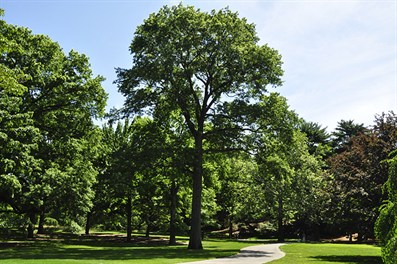

So many pleasant places to walk in 250 acres. One day when Janet
and I walk together here, then this notebook as well as my
photo files will really be bursting.
I'll hope we can do that on a day with high clouds to mute the
light. For now, the sun's moved high in the clear sky and the
light's become harsh. The camera (and I) have to work too hard to
avoid capturing only a confusion of bright spots and dark shadows.
So I'll move on.